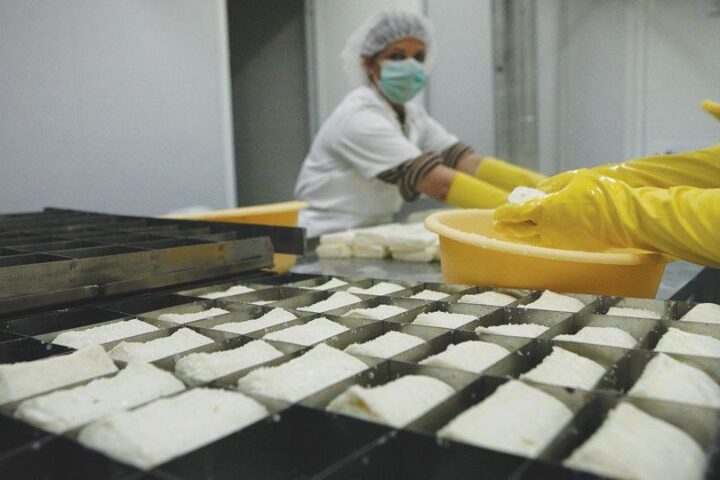In a landmark move, halloumi has earned its Cypriotness after the EU registered the island’s famous traditional cheese as a Protected Designation of Origin (PDO) product after a long political battle.
The squeaky white cheese is Cyprus’ biggest export, with halloumi generating a whopping €260 mln from 40,000 tonnes, yielding €115 mln from 17,000 tonnes sold to the UK.
That made 2020 the best year on record for halloumi exports.
After seven years of EU limbo, Cyprus’ famous cheese has finally been awarded PDO status, with the government rejoicing over the ‘historic’ move.
Nicosia has been betting on the PDO registration to fend-off pretenders to the crown, within the European Union, a legal battle that Cyprus had been losing.
“A milestone day for Halloumi/Hellim and our country,” President Nicos Anastasiades tweeted in Greek, English and Turkish.
“Significant prospects for increasing exports of our national product, to the benefit of all Cypriot producers, Greek and Turkish,” he added.
Agriculture Minister Costas Kadis also tweeted the competent EU committee’s unanimous decision “provides it (Halloumi) with a shield of protection”.
More information on the PDO registration is expected to be announced by the government.
In comments to state broadcaster CyBC, Kadis said the EU decision was a “development of great importance since our national product is registered and protected”.
The development came after Brussels took the initiative to end a stalemate in registering Cyprus’ famous traditional cheese as a protected product, with halloumi bogged down in the politics of division.
In January, the Financial Mirror reported that after being informed by a government source, the European Commission was to step up efforts to break the ice between the Greek Cypriot and Turkish Cypriot sides with a delegation visiting the island in February.
Not everybody’s happy
However, the PDO development does not seem to have made everyone happy, as cheesemakers and milk producers expressed their concerns over their ability to produce halloumi under stricter guidelines from now on.
Despite agreeing to move forward with protecting the Cypriotness of halloumi, there is disagreement on the thorniest issue of the PDO file – how the cheese is made.
The government wants to increase the ratio before 2024, when producers must follow the PDO guidelines, using at least 51% sheep’s and goats’ milk, according to the traditional recipe filed with the PDO application.
Apart from designating the cow to goat or sheep milk ratio, the PDO file also stipulates that halloumi has to be sold in the traditional block shape and not any other form.
Cheesemakers fear plunging sales of other popular products, such as halloumi burgers and light halloumi, which now will not be able to carry the brand name under the product’s specifications.
George Petrou, head of the cheesemakers’ association, told CyBC that producers would be unable to secure enough quantities of sheep and goat milk, and many breeds of these animals in Cyprus are not included in the file.
It could mean that farms will not be able to supply their milk for the production of halloumi.
Cheesemakers had a demo planned for next Monday, which they called off after a meeting with the Agriculture Minister, without giving away details of what they agreed.
Prisoner of politics
Cyprus officially filed to the European Commission its application to register the names Halloumi/Hellim as a PDO for cheese made predominantly from sheep and/or goat milk in July 2014.
On the issue of Turkish Cypriot produced halloumi, dubbed hellim, Kadis said the product’s transport through the Green Line will be done legally, through strict controls and only if the product is certified based on certain specifications.
Turkish Cypriot AKEL Member of the European Parliament Niyazi Kizilyurek said it is “an important step for producers to export halloumi to the European market.
“This decision will benefit the Hellim sector, which makes up one-third of current exports and provides the livelihood of 50,000 people”.
EU Commissioner for Health and Food Safety, Stella Kyriakides, called it a “historic achievement for Cyprus to protect its national product and increase trade with the EU”.
“After years of effort, EU member states have approved the Commission’s proposals to register halloumi/hellim as a PDO, incorporating trade across the Green Line,” Kyriakides said.
Cyprus PDO file gained momentum after an agreement was struck between Turkish Cypriots and Greek Cypriots to overcome political obstacles.
On July 16, 2015, a few days before the publication of Cyprus’ halloumi file in the EU Journal, Anastasiades and then Turkish Cypriot leader Mustafa Akinci reached an understanding in the presence of then European Commission President Jean-Claude Juncker.
After the agreement, it was understood that halloumi had found its way out of the political entanglement.
Juncker’s office issued a statement saying there was “consensus” on halloumi, but the PDO file remained locked away in Brussels.










